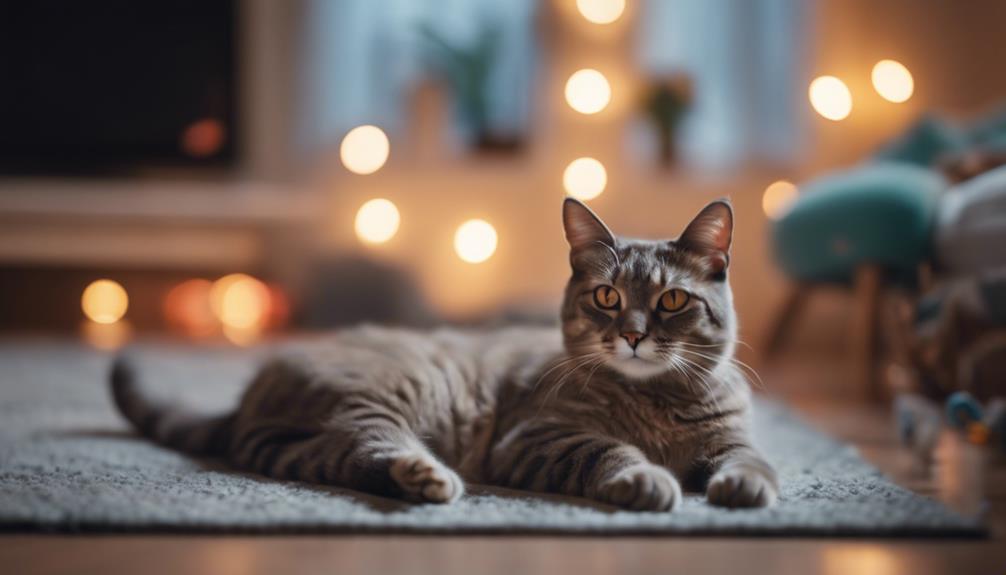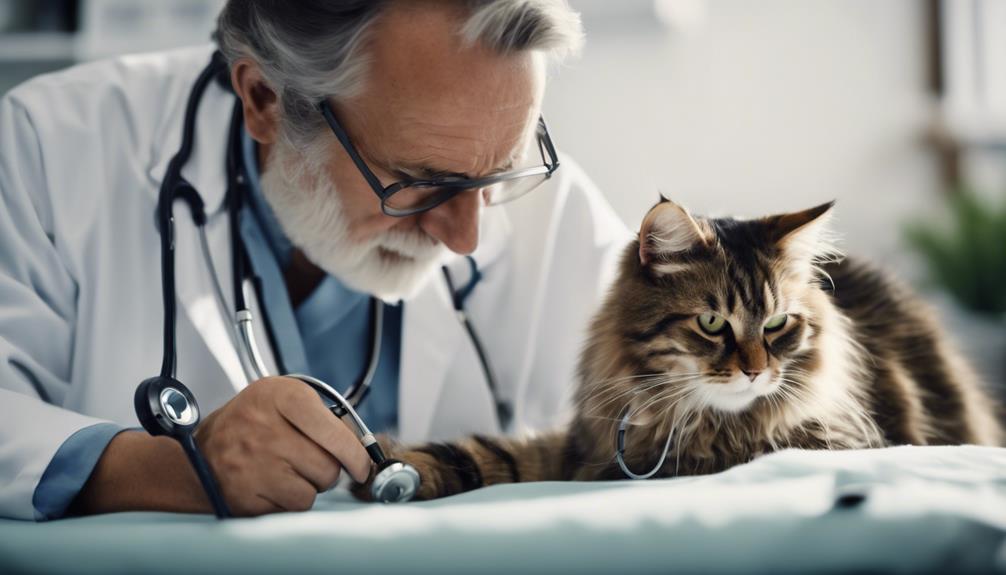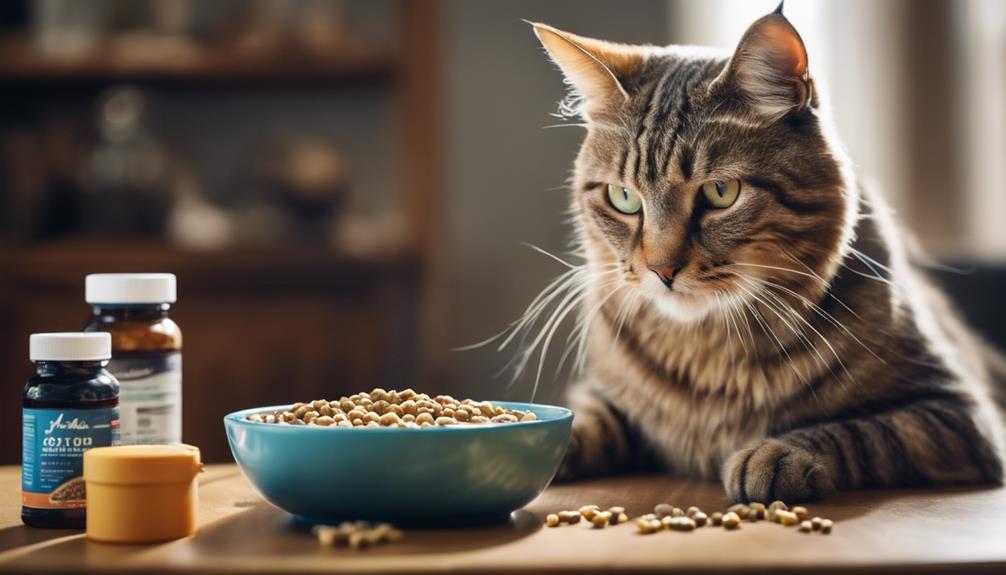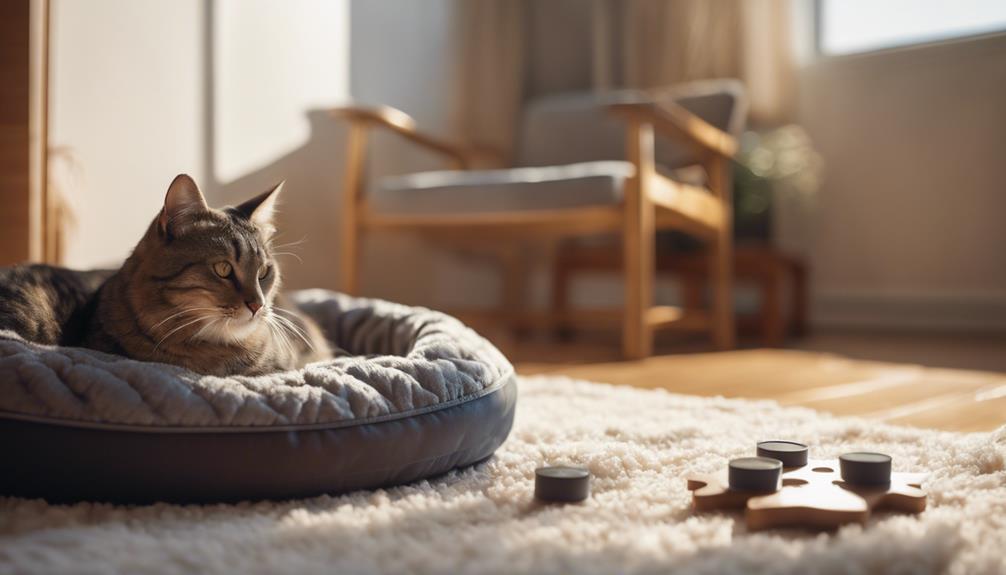As our feline companions age, it is essential to be attuned to changes in their behavior that could indicate cognitive dysfunction, commonly known as cat dementia. From subtle shifts in their daily routines to more pronounced signs like confusion or disorientation, understanding the manifestations of this condition in cats is imperative for their overall well-being.
While there are no definitive tests for diagnosing dementia in our furry friends, exploring the nuances of their symptoms and the management strategies available can offer valuable insights into providing the best care possible for senior cats.
Key Takeaways
- Look for signs like pacing and excessive vocalization.
- Consult a vet for a comprehensive assessment and diagnosis.
- Implement management strategies to improve your cat's quality of life.
- Consider medical treatments to manage symptoms and enhance comfort.
Recognizing Signs of Cat Dementia
Recognizing the subtle manifestations of cognitive decline in felines can be crucial in identifying potential signs of cat dementia. Cats experiencing dementia may exhibit symptoms such as pacing, extensive vocalization, excessive grooming, eating less, and getting stuck in corners or appearing disoriented.
These behaviors, when observed consistently, could indicate cognitive dysfunction in aging cats. As feline dementia shares similarities with human Alzheimer's disease, understanding these signs early on can help pet owners provide appropriate care and support for their senior feline companions.
Monitoring changes in behavior, interactions, and daily routines can aid in the early detection of cognitive decline, allowing for timely interventions to improve the quality of life for cats affected by dementia.
Understanding Diagnosing Procedures
Exploring the diagnostic methods for cat dementia involves a comprehensive assessment of physical health, behavioral patterns, and environmental factors. Since there isn't a specific test for dementia in cats, veterinarians typically start by ruling out physical ailments that could be causing the observed symptoms.
A thorough evaluation of the cat's medical history, including any recent changes in behavior, is crucial in the diagnostic process. Identifying and addressing any underlying physical issues is essential to ensure the well-being of the cat. Additionally, considering the cat's age and adapting its environment and care routine to better suit its needs can also aid in the management of dementia.
Implementing Management Strategies at Home

Upon completing a thorough assessment of physical health and behavioral patterns for a cat suspected of having dementia, the next crucial step involves implementing effective management strategies at home to enhance the well-being and quality of life for the aging feline.
Management strategies may include providing a comfortable and secure environment by maintaining routines, creating extra sunny spots, and using night lights for better visibility. Additionally, incorporating mental stimulation through food puzzles and toys can help keep the cat engaged.
Consideration of dietary supplements, such as vitamins and antioxidants, may also be beneficial. These strategies aim to support the cognitive function and overall happiness of a cat showing signs of dementia, promoting a better quality of life during their senior years.
Exploring Medical Treatments for Cats
Medical interventions for feline dementia focus on managing symptoms and improving comfort for aging cats. While there are no FDA-approved medications specifically for treating cat dementia, some veterinarians may prescribe off-label use of supplements like SAM-e and selegiline to help alleviate symptoms. It is crucial to note that these treatments are not officially approved for cats, so discussions with a vet are essential.
Patience and understanding are key when caring for a senior cat with dementia, ensuring their comfort and overall well-being. Providing a calm and enriched environment, along with maintaining routines and offering mental stimulation, can also contribute to enhancing the quality of life for cats affected by dementia.
Addressing Physical Ailments First

Prioritizing the evaluation and management of physical ailments is essential in addressing potential underlying causes before considering cognitive issues in cats suspected of having dementia. Cats may exhibit symptoms similar to dementia due to various physical conditions such as hyperthyroidism, hypertension, or arthritis. Therefore, a thorough physical examination, blood tests, and diagnostic imaging should be conducted to rule out these possibilities.
Addressing any physical ailments found can lead to improvements in behavior and cognitive function. It is crucial to consult with a veterinarian to develop a treatment plan that focuses on managing physical health first before exploring cognitive aspects. By addressing physical issues promptly, the overall well-being and quality of life for aging cats can be significantly enhanced.
Enhancing Quality of Life for Aging Cats
To optimize the well-being of aging cats, enhancing their quality of life through tailored care strategies is paramount. One way to achieve this is by focusing on creating a comfortable and stimulating environment that meets the specific needs of senior felines. Below is a table outlining some key strategies to enhance the quality of life for aging cats:
| Care Strategy | Description |
|---|---|
| Comfortable Sleeping Area | Provide a cozy bed in a quiet location away from noise and disruptions. |
| Regular Veterinary Visits | Schedule routine check-ups to monitor the health and address any issues promptly. |
| Interactive Toys | Engage your cat with toys that encourage physical activity and mental stimulation. |
Considering Dietary and Nutritional Support

When addressing the well-being of aging cats, a crucial aspect to consider is the provision of appropriate dietary and nutritional support tailored to their changing needs. As cats age, their nutritional requirements may shift, requiring adjustments to their diet to support overall health and cognitive function.
Providing a balanced diet rich in essential nutrients, such as omega-3 fatty acids, antioxidants, and vitamins like B-complex, can aid in maintaining cognitive function and supporting brain health in senior cats. Additionally, incorporating dietary supplements specifically formulated for senior felines can help address potential deficiencies and support their overall well-being.
Consultation with a veterinarian to determine the specific dietary needs of an aging cat is essential to ensure they receive the necessary support for a healthy and fulfilling life.
Providing Mental Stimulation and Routine
Enhancing cognitive health in aging cats involves incorporating mental stimulation activities and establishing consistent routines to support their overall well-being. Providing opportunities for mental engagement can help prevent cognitive decline and keep your feline friend's mind sharp. Interactive toys, puzzle feeders, and regular play sessions are excellent ways to stimulate your cat mentally. Additionally, maintaining a predictable daily routine can offer comfort and security to senior cats, reducing anxiety and confusion. By creating a stimulating environment and sticking to a set schedule, you can enhance your cat's quality of life in their golden years.
| Mental Stimulation Activities | Consistent Routines | Benefits |
|---|---|---|
| Interactive toys | Regular feeding schedule | Prevents cognitive decline |
| Puzzle feeders | Playtime routine | Reduces anxiety |
| Play sessions | Set bedtime routine | Increases mental sharpness |
Using Environmental Adaptations for Cats

Implementing suitable environmental adaptations can significantly enhance the quality of life for aging cats experiencing dementia symptoms. Creating a cat-friendly environment involves making adjustments to accommodate their changing needs.
Providing multiple litter boxes in easily accessible locations can help prevent accidents. Adding ramps or steps to furniture allows easier access to favorite spots. Ensuring food and water are within reach can encourage proper nutrition and hydration. Installing secure window perches or creating cozy hiding spots can offer comfort and security. Using calming pheromone diffusers or soothing music may help reduce anxiety.
Caring for Your Senior Cat With Patience
To effectively care for a senior cat exhibiting signs of dementia, patience and understanding are essential components in providing the necessary support and comfort for their aging needs.
| Patience | Understanding | Compassion |
|---|---|---|
| Be gentle and calm during episodes | Educate yourself on feline dementia | Show empathy and love |
| Take breaks when feeling frustrated | Adapt to the cat's changing behaviors | Provide a safe and secure environment |
| Practice deep breathing techniques | Communicate with your veterinarian regularly | Offer comforting physical touch |
| Celebrate small victories and progress | Seek support from other pet owners | Remember the joy your cat brings |
Frequently Asked Questions
Can Cats With Dementia Be Trained to Use a Litter Box or Should We Expect Accidents?
Cats with dementia may struggle with using a litter box due to cognitive decline. Training may be challenging, but reinforcing positive behaviors with patience and consistency can help manage accidents. Consult a veterinarian for tailored guidance.
How Can We Help a Cat With Dementia Who Is Showing Signs of Anxiety or Agitation?
To help a cat with dementia showing signs of anxiety or agitation, provide a calm environment, maintain routines, offer mental stimulation, and ensure comfort. Consider consulting a veterinarian for guidance on managing behavioral changes and potential medication options.
Are There Any Specific Breeds of Cats That Are More Prone to Developing Dementia?
Certain cat breeds may be more susceptible to developing dementia, although no specific breed predisposition has been conclusively established. Factors such as genetics, age, and overall health play significant roles in the likelihood of feline dementia development.
Is It Possible for a Cat With Dementia to Improve or Stabilize With Treatment and Care?
It is possible for a cat with dementia to potentially improve or stabilize with appropriate treatment and care. Management strategies may include dietary supplements, mental stimulation, and creating a supportive environment to enhance the well-being of the aging cat.
How Can We Prevent Our Other Cats From Becoming Stressed or Agitated by the Behavior Changes in a Cat With Dementia?
To prevent stress or agitation in other cats due to a feline with dementia, ensure a calm environment by maintaining routines, providing extra attention, and creating separate safe spaces. Implement mental stimulation and enriching activities to promote harmony among all feline companions.
:Can Dementia in Cats Cause Symptoms Similar to Arthritis?
Cats with dementia can exhibit symptoms similar to arthritis, making it difficult to recognize signs of feline arthritis. They may experience confusion, disorientation, and difficulty moving, which can be mistaken for joint pain. It’s important for cat owners to monitor their pet’s behavior and seek veterinary guidance when in doubt.
Conclusion
In conclusion, recognizing and addressing feline dementia in aging cats is crucial for providing appropriate care and improving their quality of life.
By understanding the signs, implementing management strategies at home, exploring medical treatments, and adjusting their environment, cat owners can effectively manage the symptoms of dementia in their senior feline companions.
It is essential to prioritize the comfort and well-being of senior cats by approaching their care with patience and understanding.




